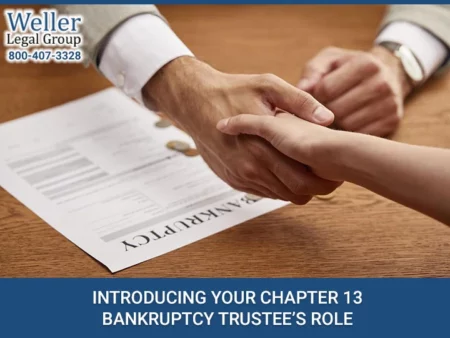 Undergoing a Chapter 13 bankruptcy is both stressful and time-consuming. You feel as though your life is in the court’s hands as they determine your disposable income and decide upon an amount that’ll be used towards repaying your debts over the next 3 to 5 years. They’re also the ones who will determine whether you can take out any more significant debt during this time. To help oversee these things, as well as others, you have a Trustee appointed to your case.
Undergoing a Chapter 13 bankruptcy is both stressful and time-consuming. You feel as though your life is in the court’s hands as they determine your disposable income and decide upon an amount that’ll be used towards repaying your debts over the next 3 to 5 years. They’re also the ones who will determine whether you can take out any more significant debt during this time. To help oversee these things, as well as others, you have a Trustee appointed to your case.
What Your Chapter 13 Bankruptcy Trustee Does
Your Trustee’s job is to analyze and authenticate the information that’s pertinent to your bankruptcy case (e.g., initial bankruptcy filing, petition, statements, schedules). To do this, they’ll need to see your financial documents (e.g., tax returns, evidence of income) and may ask you questions throughout your Chapter 13 bankruptcy. This is because they’re involved in several ways “behind the scenes” as well.
Identify Fraudulent Bankruptcy Filings
One of the first jobs your Trustee will undertake is to identify any fraudulent or deceitful activity regarding your Chapter 13 bankruptcy filing. Anyone who’s caught abusing the filing system will have their case completely dismissed.
Your Trustee will continue monitoring your case for any criminal activity. If they suspect that you’re participating in criminal activities, they’ll report you to the Department of Justice (DOJ). However, it isn’t only you that they’re monitoring. Your Trustee will also monitor your creditors to prevent any fraud from occurring.
Participate in Confirmation Plans
Your Trustee is responsible for objecting to your plan if they don’t believe it meets the qualifications of bankruptcy law or if the plan doesn’t look feasible for your financial situation. Their decision is based on several factors, which is why they’ll ensure that you’re reporting all of your income, which creditors will receive how much money, and if you’re in a position to pay them back according to the proposed plan.
Hire an Appraiser for You
Your Trustee may be able to hire an appraiser for you who will value your assets. This will help your Trustee create a reasonable plan and ensure that they treat you fairly throughout your bankruptcy case.
Attend the Confirmation Hearing
Your Trustee is also responsible for attending your confirmation hearing, where they’ll discuss with your judge whether they feel that your payment plan is reasonable. The judge then decides whether they want to approve or reject the proposed plan.
Collect Payments to Disburse to Creditors
Your Trustee must collect your plan’s payments and ensure that they’re properly disbursed to your creditors. They’ll ensure that the proper amount is collected each time. If your financial situation changes during the length of your plan, your payment amount may also change depending on the situation.
Provide Financial Advice
Your Trustee can offer you financial advice. They can also help you with creating a budget that enables you to live through this period so that you can fulfill your payment plan while still taking care of all of your necessities. If you do experience hardship during this time, you can ask them if your Chapter 13 bankruptcy plan can be modified.
Provide Status Information
Your creditors will turn to your Trustee for any information they need about your bankruptcy case. When contacted, they must provide them with your detailed information for their analysis. They’ll also tell the court when you’ve successfully completed your payment plan so that you can be discharged.
Final Thoughts
At the Weller Legal Group in Clearwater, FL, we’re here to help you with your Chapter 13 bankruptcy. Our practice is here to support you as you work with your Trustee. Regardless of where you’re located throughout the state of Florida, we invite you to reach out to us if you’re considering filing for bankruptcy.
Picture Credit: VistaCreate

